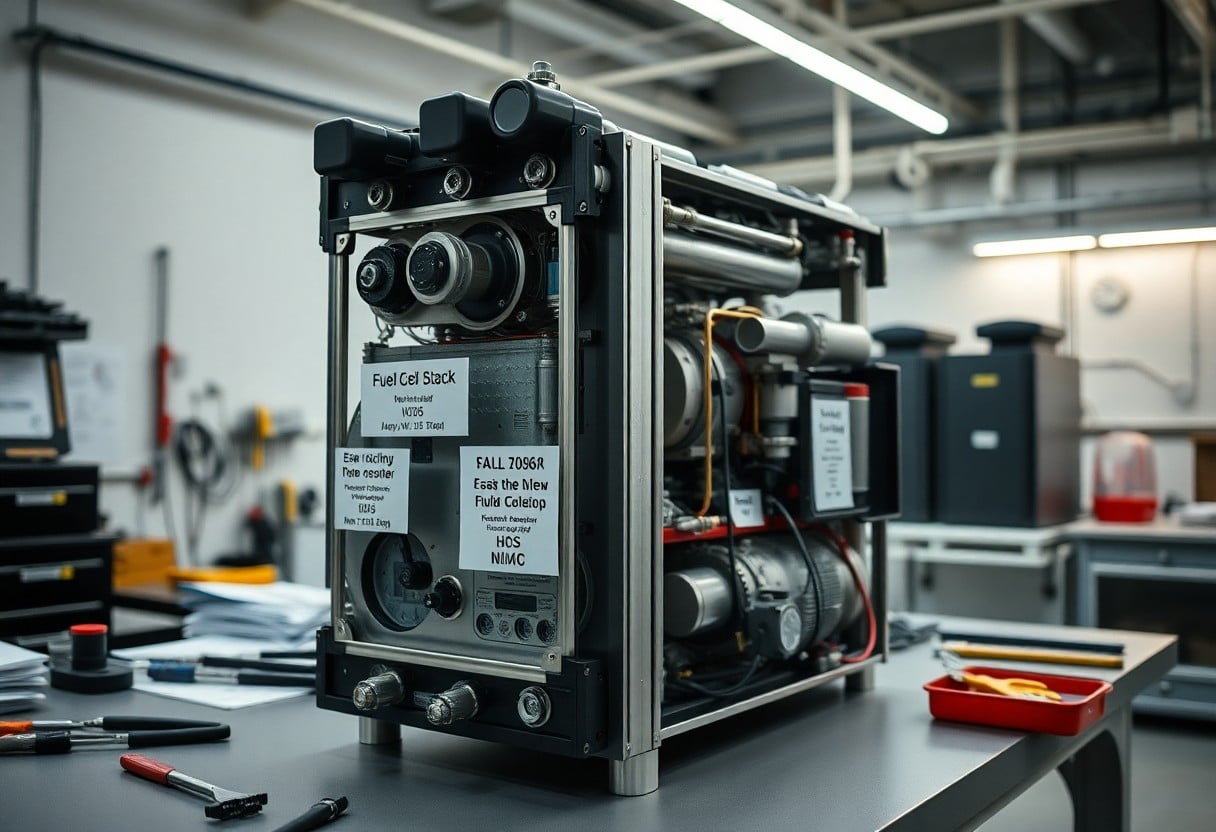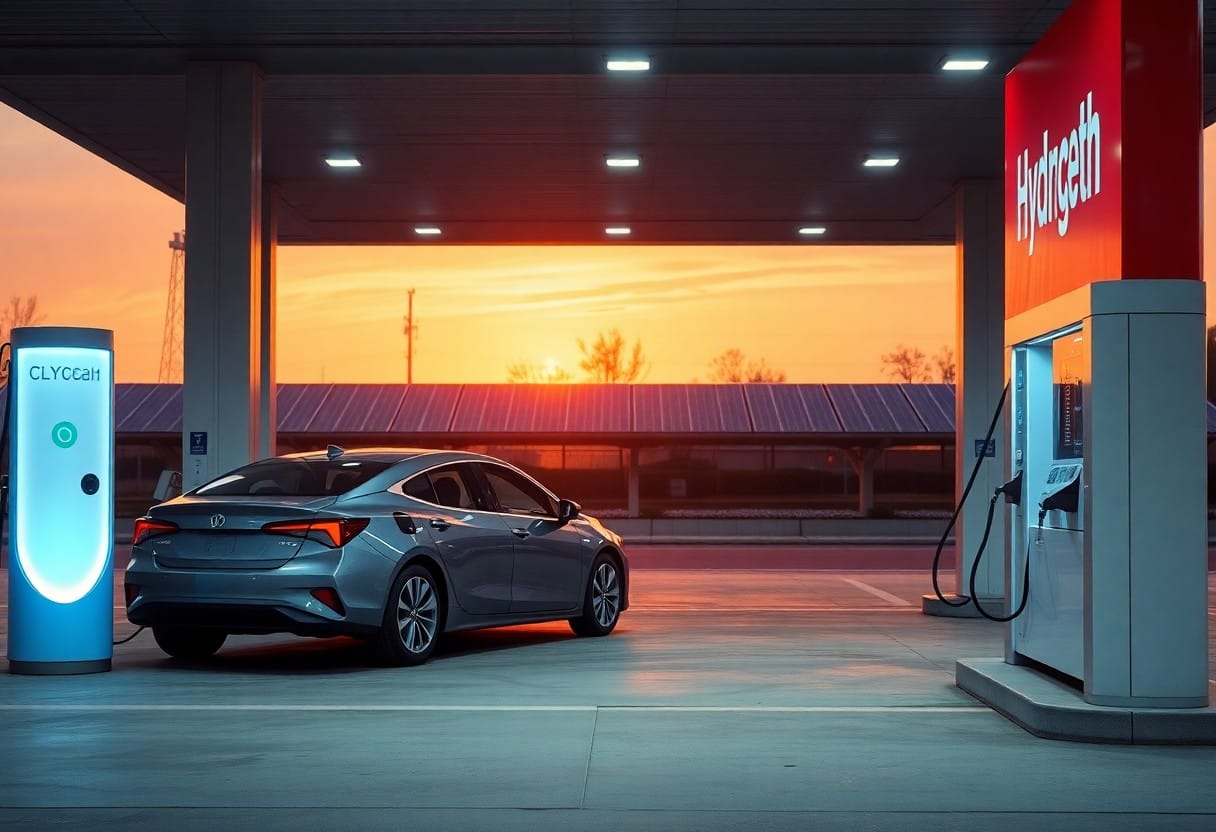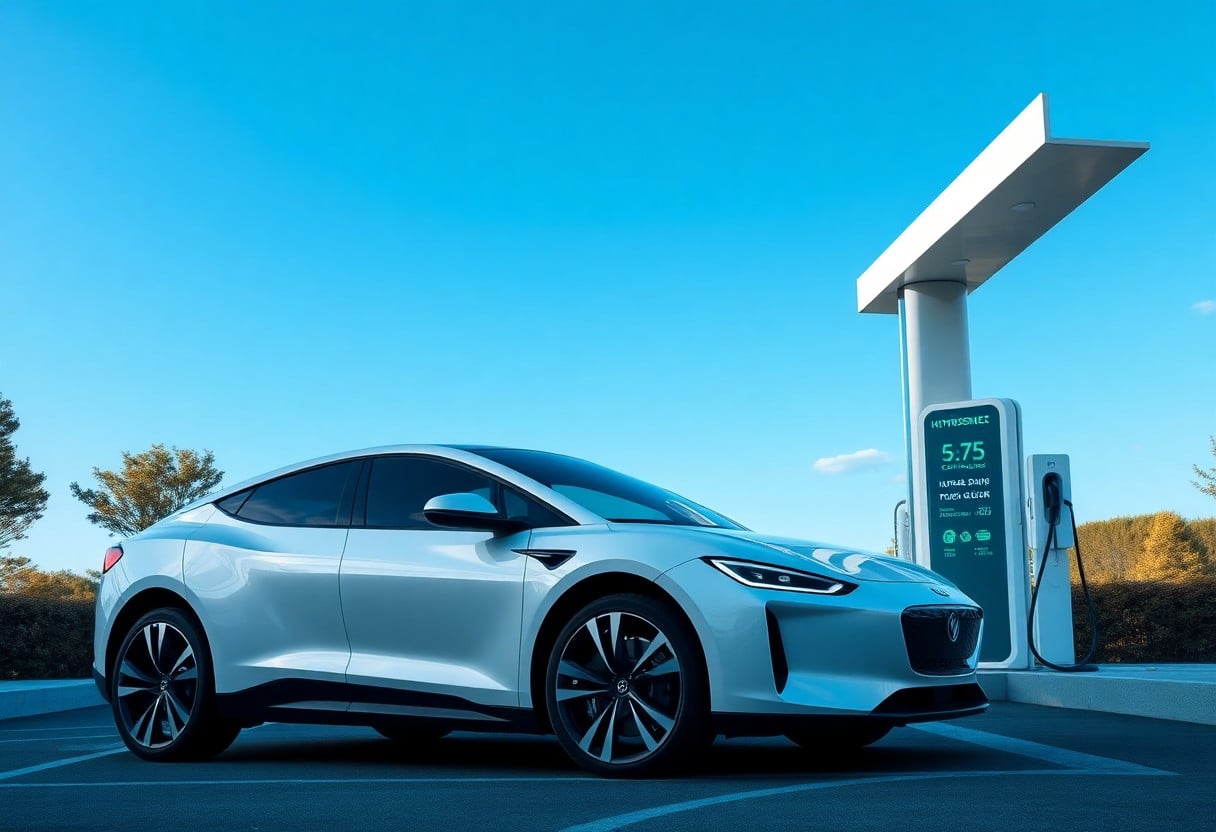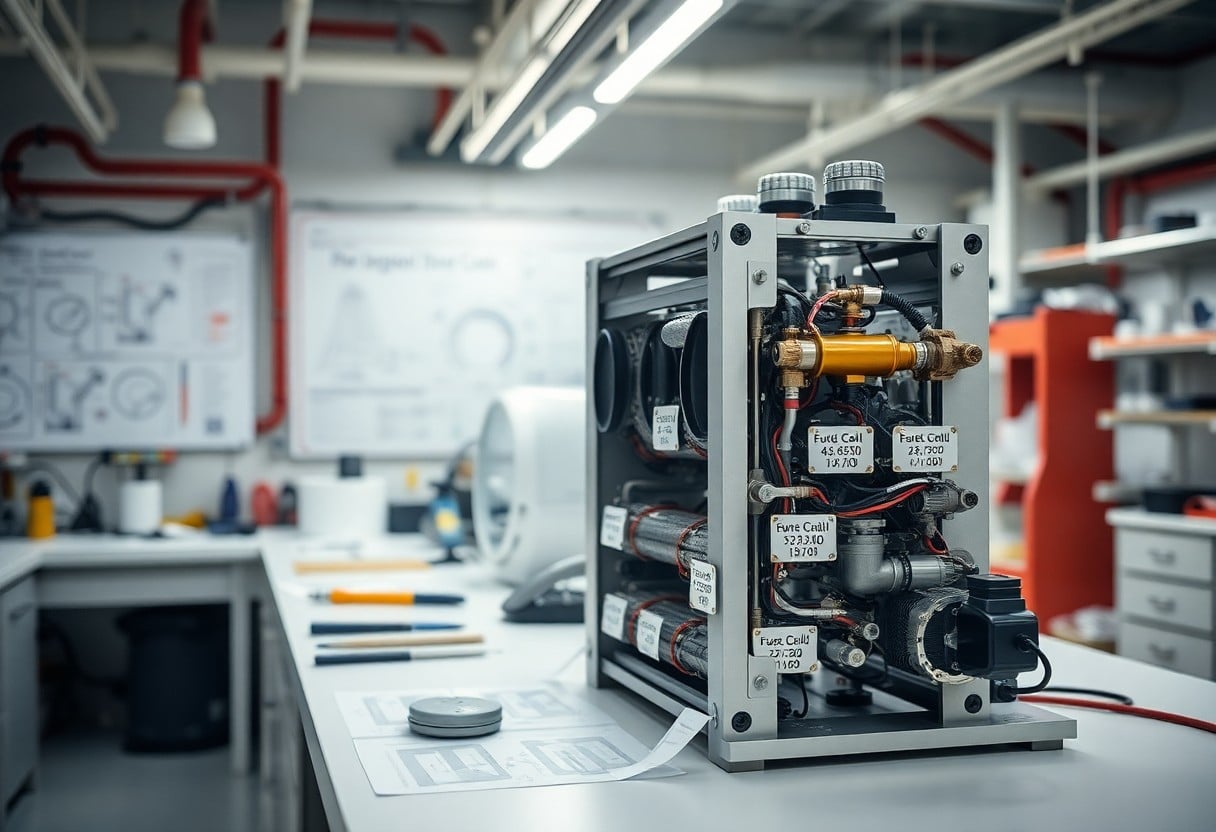Many people are excited about the potential of hydrogen vehicles, but have you ever considered how fuel cell efficiency plays a role in their future? As technology advances, understanding how fuel cells convert hydrogen into energy can help you grasp the full impact on performance, cost, and sustainability. In this blog post, you’ll discover how improvements in fuel cell efficiency can shape the landscape of hydrogen vehicles, making them more appealing for your eco-friendly transportation choices.

Breaking Down Fuel Cell Efficiency
Fuel cell efficiency is a key factor in maximizing the performance of hydrogen vehicles. It refers to how well a fuel cell converts chemical energy found in hydrogen into electrical energy, which powers the vehicle. Higher efficiency means more energy is harnessed from the same amount of hydrogen, leading to potentially longer ranges and reduced fuel costs in practical applications. Understanding efficiency is important for both manufacturers and consumers as it directly impacts the feasibility of hydrogen as a viable alternative to conventional fuels.
What Determines Fuel Cell Efficiency?
Several factors influence fuel cell efficiency, including the design of the fuel cell, the type of catalyst used, and the operating conditions. For instance, proton exchange membrane (PEM) fuel cells typically operate around 50-60% efficiency under standard conditions. Innovations in materials and engineering, such as improved catalysts like platinum, can enhance performance, while temperature and pressure levels during operation also play a crucial role in achieving optimal efficiency.
The Relationship Between Efficiency and Energy Output
Efficiency and energy output are closely linked in fuel cells. When a fuel cell operates efficiently, it can deliver more energy from the same fuel input, translating into enhanced overall vehicle performance. For example, a fuel cell with a 60% efficiency can provide greater energy for driving compared to one operating at 40%. This relationship means that advancements in fuel cell technology can significantly enhance the range and affordability of hydrogen vehicles, allowing for broader acceptance and adoption in the market.
To put this into perspective, consider that with an efficiency boost from 40% to 60%, you could achieve over 33% more driving range with the same quantity of hydrogen stored. It’s not just about efficient fuel utilization; this progression also affects the overall lifecycle costs of a hydrogen vehicle, impacting your decisions as a consumer. Consequently, focusing on improving fuel cell efficiency could pave the way for the next generation of hydrogen vehicles, ultimately making them more appealing and accessible.
Fuel Cell Efficiency: The Key to Cost-Effective Hydrogen Vehicles
Fuel cell efficiency directly influences the economics of hydrogen vehicle development. When these cells convert hydrogen into electricity with minimal energy loss, they significantly lower operational costs for manufacturers and consumers alike. This efficiency means that less hydrogen is needed to achieve the same range compared to less efficient alternatives, making hydrogen vehicles more appealing in terms of price per mile.
The Economic Implications of Higher Efficiency
Higher fuel cell efficiency leads to reduced hydrogen consumption, which can drive down production costs and ultimately lower retail prices for consumers. With more efficient fuel cells, the entire supply chain benefits, as manufacturers can spend less on fuel, while consumers enjoy longer ranges and fewer stops for refueling. The overall market for hydrogen vehicles also becomes more competitive, fostering innovation and investment in the sector.
Comparing Fuel Cells to Conventional Internal Combustion Engines
Your understanding of the differences between fuel cells and conventional internal combustion engines is imperative. Fuel cells can achieve efficiencies of up to 60%, while traditional engines peak around 25-30%. This higher efficiency translates into lower operating costs and less environmental impact, making hydrogen vehicles a compelling choice for future mobility. Additionally, fuel cells produce zero tailpipe emissions, which is a significant advantage over the CO2 emissions generated by internal combustion engines.
Efficiency Comparison Table
| Fuel Cell Efficiency | Internal Combustion Engine Efficiency |
|---|---|
| Up to 60% | 25-30% |
Fuel cells outperform conventional internal combustion engines not only in terms of efficiency but also with respect to sustainability. While a gasoline engine converts only a fraction of its fuel into usable energy, resulting in wasted heat and harmful emissions, fuel cells generate electricity more efficiently and emit only water vapor and heat. This cleaner operation stands to benefit your driving experience and the environment, leading to a future where hydrogen vehicles gain rightful prominence on the roads.
Environmental Impact Table
| Fuel Cell Emissions | Internal Combustion Engine Emissions |
|---|---|
| Zero tailpipe emissions | Significant CO2 and pollutants |
The Role of Technological Innovations in Fuel Cell Development
Technological innovations are key in advancing fuel cell efficiency, directly impacting hydrogen vehicle viability. Breakthroughs in engineering and chemistry are paving the way for more efficient, cost-effective fuel cells. These advancements ensure that hydrogen vehicles are not only cleaner but also match the performance of traditional gasoline-powered vehicles, making them more appealing options for consumers.
Advances in Materials and Design
Innovative materials and cutting-edge design techniques are enhancing fuel cell performance. Researchers are experimenting with new catalysts such as platinum alternatives, which promise to reduce costs while maintaining high efficiency. Additionally, lightweight yet sturdy materials are being utilized in fuel cell stacks to improve durability and overall efficiency. These advancements make hydrogen vehicles lighter, enhancing their range and performance.
The Potential of Artificial Intelligence and Machine Learning
Artificial intelligence (AI) and machine learning (ML) are revolutionizing fuel cell technology by optimizing performance and predicting failures. You’ll find that data-driven insights help engineers develop smarter designs and improve maintenance processes, ultimately enhancing the reliability of hydrogen vehicles. Integration of these technologies allows for adaptive learning, where fuel cells can adjust their operation based on real-time data, maximizing efficiency and longevity.
Imagine a future where your hydrogen vehicle incorporates AI algorithms that continuously analyze driving patterns and environmental conditions. These systems can optimize energy consumption, automatically adjusting the fuel cell output for maximum efficiency. For example, ML can assist in identifying the ideal operating conditions under various loads, predicting when maintenance is due, and improving the overall lifecycle of the fuel cell. As AI develops, it will play a pivotal role in personalizing your driving experience and enhancing the sustainability of hydrogen vehicles, solidifying their place in the automotive landscape.

Policy and Infrastructure: The Backbone of Hydrogen Vehicle Adoption
Fostering a robust policy framework and infrastructure is important for the successful adoption of hydrogen vehicles. Governments around the world are recognizing the potential of hydrogen as a clean energy source and are implementing regulations and incentives to encourage its use. This supportive environment not only promotes research and development but also attracts private investment required to build a sustainable hydrogen economy. Ultimately, your willingness to embrace hydrogen technology will depend on the availability of important resources and a comprehensive infrastructure that makes fueling accessible and convenient.
Government Initiatives and Incentives
Government initiatives play a significant role in shaping the hydrogen landscape. Many countries are rolling out tax incentives, grants, and funding for research to advance hydrogen technologies. For instance, the European Union has allocated billions towards achieving a hydrogen economy by 2030, with specific targets for hydrogen-powered vehicles. Such initiatives lower barriers for manufacturers and consumers alike, paving the way for widespread adoption and driving innovation in hydrogen vehicle technology.
Building a Hydrogen-Fueling Network: Challenges and Opportunities
Establishing a comprehensive hydrogen-fueling network presents both challenges and opportunities. While hurdles like high initial infrastructure investment and limited public awareness exist, building partnerships among industry stakeholders can create synergies that drive down costs and foster innovation. The potential benefits are significant; a well-developed fueling network increases consumer confidence, boosts vehicle sales, and enhances the reliability of hydrogen as a viable alternative to fossil fuels. Collaborations among governments, private entities, and research institutions will be critical in overcoming these obstacles and ensuring future progress.
Building a hydrogen-fueling network involves strategic planning and execution, with both logistical and regulatory considerations shaping the process. The initial investment for producing, transporting, and dispensing hydrogen is considerable, and many regions lack an established network to support user demand. However, opportunities abound in urban areas, particularly as public-private partnerships emerge to fund new fueling stations due to strong consumer interest and government backing. Innovative technologies and modular hydrogen stations can also help alleviate some infrastructure challenges, creating a robust backbone for hydrogen vehicles in the coming years.

A Shift in Consumer Perspectives on Sustainable Transportation
Shifts in consumer perspectives regarding sustainable transportation are becoming increasingly evident, as the focus on environmental impact grows. More individuals are open to exploring alternatives to traditional vehicles, and hydrogen vehicles are stepping into the spotlight. Fueled by concerns over climate change and the depletion of fossil fuels, you might find yourself evaluating the choices you make when it comes to transportation. As fuel cell technology advances and becomes more efficient, the appeal of hydrogen-powered vehicles is likely to rise in your eyes, revealing a promising future for sustainable travel.
How Efficiency Influences Consumer Choices
Fuel cell efficiency plays an informative role in your decision-making process as a consumer. Higher efficiency means greater distances on a single fill-up, directly impacting your travel range and convenience. If you know that hydrogen vehicles can match or exceed the capabilities of gas-powered cars, you’re more likely to consider purchasing one. Attaining that heightened level of efficiency reinforces your belief in hydrogen technology as a viable alternative, ultimately shaping your transport preferences.
Promoting Awareness and Acceptance of Hydrogen Technology
Increased awareness of hydrogen technology can pave the way for broader acceptance. Campaigns highlighting the benefits of hydrogen vehicles, including their reduced emissions and efficient energy use, can help alter perceptions. Moreover, initiatives that provide firsthand experiences—like test drives or educational workshops—allow you to engage more deeply with the technology. By showcasing real-world applications and success stories, you may feel more comfortable incorporating hydrogen vehicles into your daily life.
Engaging consumers through educational initiatives and real-life demonstrations can significantly contribute to the acceptance of hydrogen technology. For instance, organizations hosting community events and test-drive opportunities allow you to experience the performance and convenience of hydrogen vehicles firsthand. By partnering with local governments or environmental groups, these campaigns can showcase real-life success stories, provide comparisons with traditional fuel options, and share advancements in fuel cell efficiency. All of these efforts not only bridge the knowledge gap but also create a supportive community around hydrogen vehicles, fostering a positive shift in consumer attitudes toward sustainable transportation.
Conclusion
Taking this into account, the efficiency of fuel cells significantly impacts the future of hydrogen vehicles, shaping your driving experience and influencing the broader adoption of cleaner transportation. As fuel cell technology improves, you’ll likely enjoy longer ranges and quicker refueling times, all while contributing to a more sustainable planet. The potential for hydrogen vehicles to become mainstream hinges on advancements in fuel cell efficiency, making it an exciting area to watch for your next vehicle choice.




Pingback: Why Is Hydrogen Refueling Infrastructure Critical For HFCV Adoption? -